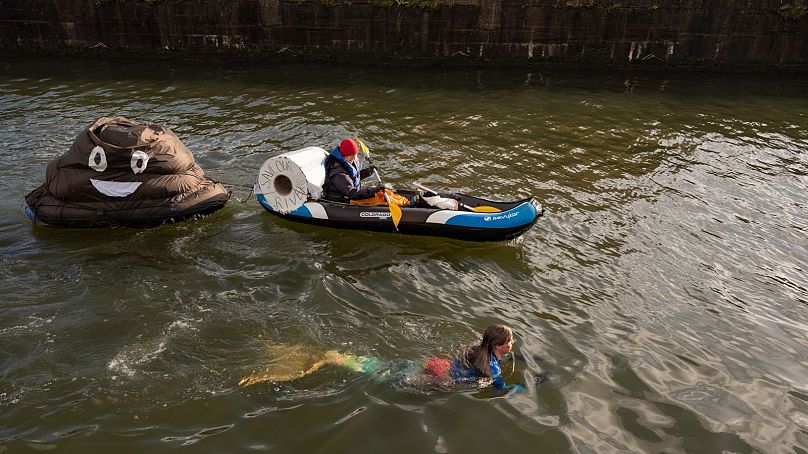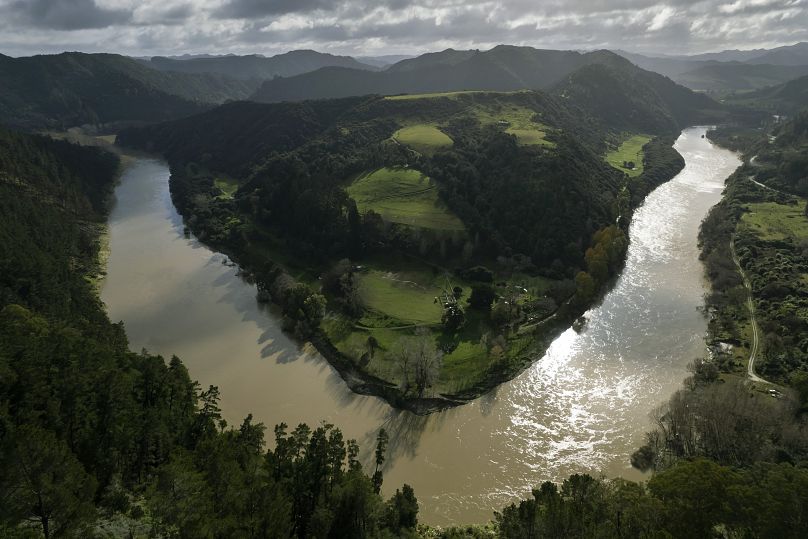What legal tools does the Good Law Project founder's new book Bringing Down Goliath give Brits for defending nature?
 ADVERTISEMENT
ADVERTISEMENT
If you want a visual metaphor for the law, picture London.
“Old and new, planned and wanton, elegant and grotesque all at once. No legal system, in the common law world at least, was planned from scratch by a master builder. What we have developed haphazardly over time.”
This is how Jolyon Maugham KC describes it in his new book Bringing Down Goliath, which charts the origins and ongoing battles of the Good Law Project (GLP). He founded the campaign organisation in 2017 and through crowdfunding appeals, the non-profit has brought cases on a range of issues - from Brexit to sewage pollution, trans rights to pandemic PPE contracts.
The law is both a weapon and battleground for the GLP. In arguing that the law can be a force for good, it patrols the fracture lines between what is right and what is legal.
“Some things which are illegal - noisily protesting at the destruction of the planet outside the offices of Big Oil - are moral,” writes Maugham, while some immoral things are legal. There’s nothing new about this predicament. Though, arguably, ‘wrong’ climate-related laws present a more total existential threat.
But Maugham’s next step - signing a ‘declaration of conscience’ alongside more than 120 other British lawyers - has proved deeply controversial.
What is the UK lawyers’ ‘declaration of conscience’?
In March, the signatories vowed not to act for new fossil fuel projects or to prosecute peaceful climate protesters.
It breaks the profession's “cab rank” rule, which says that a barrister must take a case they are qualified for, provided they are available to do so, in the interests of fair representation.
“I think that laws that encourage the destruction of the planet, and punish those who protest against them, are laws that are wrong,” Maugham tells Euronews Green.
Critics say the declaration unfairly demonises barristers doing their job and is an empty gesture from lawyers (like Maugham, a tax specialist) who aren’t asked to prosecute climate activists. Some view GLP in this vein too; as a kind of political meddling with the best system we’ve got.
Dubious passengers whizzing around in black cabs are, like it or not, part of the law’s cityscape. There’s no role for a master re-builder to change the whole system, but how can we make the streets greener and the air cleaner to breathe?
How can the law better protect the environment?
“If you are wanting to construct a legal system that is supportive of the environment, there are a whole spectrum of ways in which you might rethink what the law does and how it stands in respect of the environment,” Maugham says.
The GLP depends on public outrage to fund its litigation, and few environmental causes have appalled the British public like the pollution of waterways with sewage.
Raw sewage was discharged into English rivers 825 times a day last year, according to Environment Agency data. With the regulator seemingly unable to keep private water companies in check, what can the law do?
To find out, GLP is supporting the Marine Conservation Society, family-run business Richard Haward’s Oysters and surfer-activist Hugo Tagholm in bringing a case against the Environment Secretary. They claim that the government’s ‘Storm Overflows Discharge Reduction Plan’ is unlawful as it gives water company bosses until 2050 to stop the mass discharges of sewage.
This kind of challenge to a decision from a government or other public body is known as ‘judicial review’ - and it’s the main avenue GLP uses. More unusually, the co-claimants have resurrected an ancient common law as one of their grounds for bringing the case.
The Public Trust Doctrine says that the foreshore and coastal waters are assets held ‘in trust’ for the public, to safeguard their rights to fish, gather food - and (the claimants argue) enjoy.
The High Court has set a hearing date for early July, and Maugham believes the case will have “very profound impacts” if it succeeds.
Should rivers have rights?
Maugham grew up in New Zealand, a country envied for its beautiful blue rivers and lakes.
“But in fact, many of New Zealand’s waterways are now destroyed, devastated by huge increases in dairy production and the agricultural runoff that generates,” he explains. “All of the rivers that I swam in as a kid are now unswimmable.”
It’s a universal “plague”, and one the GLP is currently helping fight on the banks of the River Dore in Herefordshire, where the council has approved a farm’s ‘giant’ new livestock shed.
Anxious that more manure will inflict ecological damage on this tributary of the Wye, campaigners are trying to get the decision overturned in the UK’s Supreme Court.
GLP’s third ‘clean waters’ case made it all the way to the UK's final court of appeal in March. It concerns sewage discharges by the United Utilities water company into the Manchester Ship Canal. The judges will decide whether the firm can be subject to private legal action over these discharges, in this case from the canal’s owner.
Maugham is “optimistic about the outcome” - and the potential for water companies to be sued in new ways if the case is successful.
A more ambitious bit of legal landscaping, he explains, would be extending the concept of legal personhood to nature. “Does a river have a value irrespective of its use as a resource for human beings that the law ought to protect?” asks Maugham.
“Does an animal species have that value? Does a national park? Looking at these questions purely through the lens of their utility to humanity is inhibiting and not always productive of ecologically-sensible policymaking.”
The reason why a river having ‘standing’ (sufficient interest to bring a case) is the right result is because treating the environment as a resource for humans leaves ecosystems unprotected, he says. An upstream polluter can pay off someone with an economic interest downstream, but this exchange does nothing to preserve the river.
Though the ‘rights for nature’ movement is relatively new in the UK, Maugham points to the idea of companies as legal persons.
“If we can do it for companies, why can we not do it for parks or mountains or rivers? Or snow leopards?”
What environmental cases has the Good Law Project won?
Another model for defending nature might be a bill of rights for the environment. In the same way as human rights are enshrined by the UK’s Human Rights Act - a touchstone for judges - this could provide an overarching code against which environmental damage is assessed.
Pending new legislation like this, change is more piecemeal. And it depends on political winds.
After former Prime Minister Boris Johnson’s landslide victory in 2019, Maugham describes how GLP turned from the political to the environmental space. Alongside journalist George Monbiot and Ecotricity founder Dale Vince, they landed on challenging a government planning policy which favoured fossil fuel over renewable energy infrastructure.
Victory was claimed in 2020, when the government agreed to review the policy, publishing an improved Energy National Policy Statement the following year.
In 2022, together with ClientEarth and Friends of the Earth, GLP scored a big win when the High Court ruled that the government’s net zero strategy was unlawful. Since the revised plan is also “disappointing”, the trio are considering further legal action.
But the window for judicial review is narrowing, Maugham argues in Bringing Down Goliath.
Is crowdfunding litigation a good route for climate action?
About one in 25 judicial reviews launched in the years up to 2020 succeeded in court, he writes.
“In 2021, after a period of sustained attack on what was asserted by right-wing think tanks to be overreach by judges, the equivalent figure slumped to one in fifty.”
The net-zero case last July was the last time that he can remember GLP being found to have standing. In August, then PM-hopeful Rishi Sunak announced that he would take on “lawfare” to stop politically motivated cases.
So is there still space for this kind of legal campaigning? “There is still room,” Maugham maintains, “you just have to accept that it is much more difficult.”
Sometimes GLP brings cases it estimates have a less than 50/50 chance of success because they raise important issues and expose where the law is wrong.
“It’s not difficult to only pick winning cases,” argues Maugham, “but what you sacrifice is impact.”
On its own scorecard, GLP chalks up 44 per cent wins, 35 per cent losses, and 21 per cent mixed results.
“We do try to signal in our language something about what the prospects of succeeding are,” he adds. “Sometimes our language is more bullish and sometimes our language is less bullish.”
A platform for legal advice and crowdsourcing experience
In the book’s last chapter - aptly named ‘Slingshots’ - Maugham reveals that GLP is looking at creating a platform for sharing legal advice which can be used for multiple actions.
For example, holding the more than 300 local authorities which have declared a climate emergency to account.
“There is a really attractive opportunity to share legal resources cascaded down from the top and enable peer-to-peer support so as to enable those communities to bring litigation themselves,” he tells Euronews Green.
“One of the problems that we face when confronted by the scale and extent of environmental destruction is a sense of hopelessness.
“And I think the antidote to that actually is in giving people means by which they can respond, by which they can come to feel hope, by which they can recover agency over what has been done to their communities.”












